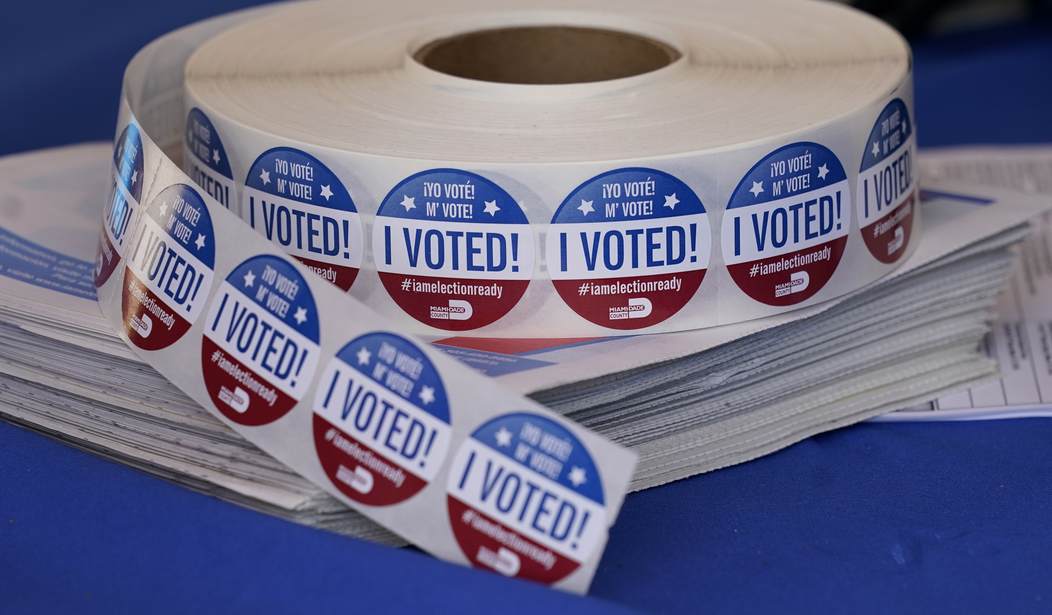To listen to Democrat politicians about government-issued photo IDs, in the age smartphones and the Internet, boggles the rational mind. Democrats would have you believe that requiring ID for voting is a recent and burdensome phenomenon. Yet, virtually every country on earth, except the United States, requires government issued ID in order for individuals to vote. Indeed, in many countries around the world, absentee voting is not permitted: Show up with your ID, or don’t cast a vote.
167 Years and Counting
Surprisingly to many people, the photo ID has been with us for quite a long time. In 1854, a French photographer by the name of Adolphe Disderi perfected a method for creating miniature portraits. In 1857, the Duke of Parma devised a business card that included a small portrait of himself. By 1859, the notion of carrying a photo ID on one’s person had spread from Europe to the U.S.
By the time of the U.S. Civil War, photographs printed on cards became a standard. In uniform, soldiers for both the Union and the Confederacy had their pictures taken before they went off to war. They also brought with them pictures of their families and loved ones.
In 1876, at the Centennial exposition held in Philadelphia, organizers needed a method to protect legitimate season passes, paid for by patrons, against unauthorized and bogus passes devised by non-paying, wannabe attendees. So, by using a variety of procedures unavailable to laypeople, they devised what was forerunner to today’s photo ID.
Universal Usage
From that time on, the photo ID became popular around the world, embraced by the Japanese in the early 1900s, and then notoriously employed by Nazis to shepherd Jews into ghettos during the World War II. By the end of the last century, photo IDs were a virtual universal phenomenon in America and, with advanced technology, caught on in many realms of society, most notably for driver’s licenses.
Recommended
Today, whether or not a U.S. citizen has a driver’s license, everyone can easily and affordably obtain a government-issued ID. State motor vehicle departments will issue a non-driver’s ID to individuals who demonstrate their citizenship. And that comes in handy: Here is a partial list of items and activities, in no particular order, for which you either must offer a photo ID, or for which you might be requested to offer one:
- Applying for Medicaid
- Applying for Social Security
- Applying for a job
- Applying for and receiving unemployment compensation
- Renting a home or apartment
- Purchasing alcohol
- Purchasing cigarettes
- Opening a checking or savings account
- Applying for food stamps
- Applying for welfare
- Driving a taxi cab
- Driving to Canada
- Driving to Mexico
- Renting a hotel room
- Renting a motorbike
- Buying a house
- Applying for a mortgage
- Driving a car
- Renting a car
- Buying a car
- Applying for a hunting license
- Applying for a fishing license
- Obtaining a marriage license
- Purchasing a gun
- Adopting a pet from the ASPCA
- Renting jet skis, boats, canoes, and snowmobiles
- Skydiving
- Bungee-jumping
- Boarding an airplane
- Enlisting in the Armed Services
- Donating blood
- Booking a cruise
- Boarding a cruise ship
- Holding a rally
- Buying an "M" rated video game
- Buying a cell phone
- Visiting a casino
- Entering a bar
- Picking up a prescription
- Purchasing certain cold medicines
- Buying a lottery ticket
- Collecting lottery winnings
- Buying an Amtrak or Greyhound Bus ticket
- Sending an Amtrak express shipment
- Storing baggage at Amtrak stations
- Receiving veterans benefits
- Nominating someone to run for public office
- Running for public office
- Shipping a package at UPS retail locations
- Shipping a package at U.S. Postal Service locations
- Picking up a package at U.S. Postal Service locations
- Posting on Instagram
- Being pulled over by a State trooper
- Applying for a U.S. passport
- Entering a U.S. Court of Appeals
- Taking a college placement test
- Being admitted to a College Level Examination Program test center
- Being admitted to a Graduate Record Exam test center
- Being admitted to a Law School Admission Council test center
- Visiting the U.S. Naval Academy, West Point, Quantico, etc
- Enrolling in home swapping vacation arrangements
- Returning an item at Walmart or Target stores
- Reinstating a disabled Facebook or LinkedIn account
- Attending various U.S. military or space symposiums
- Receiving senior discount bus and movies fares
- Receiving free immunizations for eligible children
- Making a pawn shop purchase
- Doing business with a local, state, or federal court
- Being accepted to a medical marijuana program
- Taking a Federal Aviation Administration test
- Taking an Automotive Service Excellence test
- Entering the Pentagon
- Visiting someone in prison
- Attending an NC-17 adult movie
- Receiving your own medical records
- Receiving unclaimed property
- Participating in most public road races
- Claiming a prize from a radio station sponsored contest
- Appearing before court appointed handlers when on parole or probation
- Purchasing fireworks
Bogus Claims of Discrimination
Despite all of the above, the Left insists that requiring ID for voting is somehow discriminatory against certain groups of people! Since most people are wise on the issue of voter ID, please carefully explain how requiring a photo ID suppresses the vote, as many people don't understand how anyone without a state-issued photo ID can function at all in society.
























Join the conversation as a VIP Member